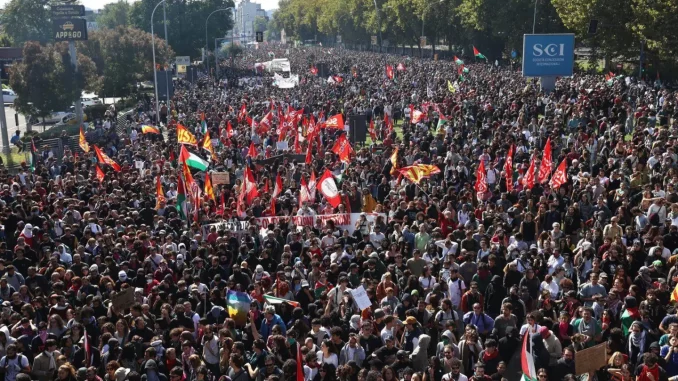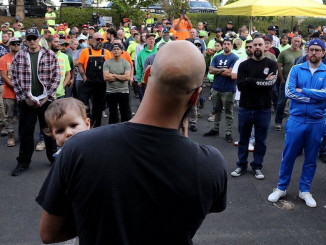
For the past two weeks, Italian workers and a diverse layer of the population have been rising up against the genocide in Gaza. In a movement they call “Let’s Block Everything,” Italian port workers are threatening to halt all shipments from Italian ports to Israel, and much of the population is showing their support. In two days of general strikes, on September 22 and again on October 3, they have demonstrated their ability to stop and disrupt not only trade but the very functioning of the Italian economy.
The first major action was a one-day general strike on September 22. The action was planned collectively by Genoese dockworkers at meetings in early September. An estimated 500,000 people took to the streets in about 80 different locations. In Genoa and Ravenna, dozens and then hundreds of dockworkers calmly stopped work, blocked the entrances to their ports, and stopped traffic to begin the action. Many schools were closed, most train transport was halted, port work was stopped. The biggest protests were in the largest cities: Rome, Milan, Turin, Genoa and others saw crowds of 50,000 and more, in some cases shutting down major central city areas. In Milan, tens of thousands marched to the central train station where they were challenged by police in riot gear, triggering confrontations between the police and mostly younger protesters.
This day of mass protest was organized and pushed forward not by the major union confederations, but mostly by the Autonomous Collective of Port Workers, a Genoa-based collective of militant and internationalist-minded workers. This group, known by its acronym CALP, has functioned since 2011 and built international connections among European port workers. In 2019, they and French port workers used their network to stop shipments of weapons and military technology to Saudi Arabia. In July, port workers in Greece joined the movement by refusing to load weapons-grade steel bound for Israel. Also in July, the Genoa workers joined in a coalition with other Genoese organizations to collect 40 tons of food to be sent to Gaza. In recent weeks they have also been part of the creation of a new structure, the International Port Workers Alliance, which includes major unions from a number of European, Middle-Eastern and North-African nations. And now this. Workers are showing their ability to organize and lead, even if their union leaders only trail behind.
In the days following September 22, more protests erupted in response to callous and anti-worker comments from Prime Minister Giorgia Meloni and other right-wing government officials. One of her ministers called the protesters “criminals, hooligans, and delinquents,” a typical right-wing insult aimed at anyone who wants a better world. Then, in direct response to Israel’s stoppage of the Global Sumud Flotilla, a second general strike was called. This time it was supported by Italy’s largest union confederations, whose leaders obviously see the radicalization of their members and the larger population against Israel’s barbarism.
This most recent strike, which occurred this past Friday, October 3, engaged an estimated two million workers and students and brought much of the nation to a standstill. Mass marches occurred in all major towns and cities, with more than 100,000 filling the streets in Rome and Milan. In all of these protests and strikes, students and youth have also had a large presence. On Sunday, Rome again saw a river of tens of thousands flowing in its streets and past its famous Colosseum.
Two general strikes in just two weeks. Workers building class-based power in alliance with students and other political militants. Autonomous collectives of workers forming across national boundaries. Altogether millions on the streets, including many youth who are horrified and outraged not only by the Gaza genocide, but by the violent future that capitalism is handing them.
The people of Italy and in particular the organized workers of Genoa’s Autonomous Collective are standing up for themselves and the oppressed of Palestine. We can learn from them. We will need to go further. But they are reminding us of what we are capable of if we organize and use our power.




